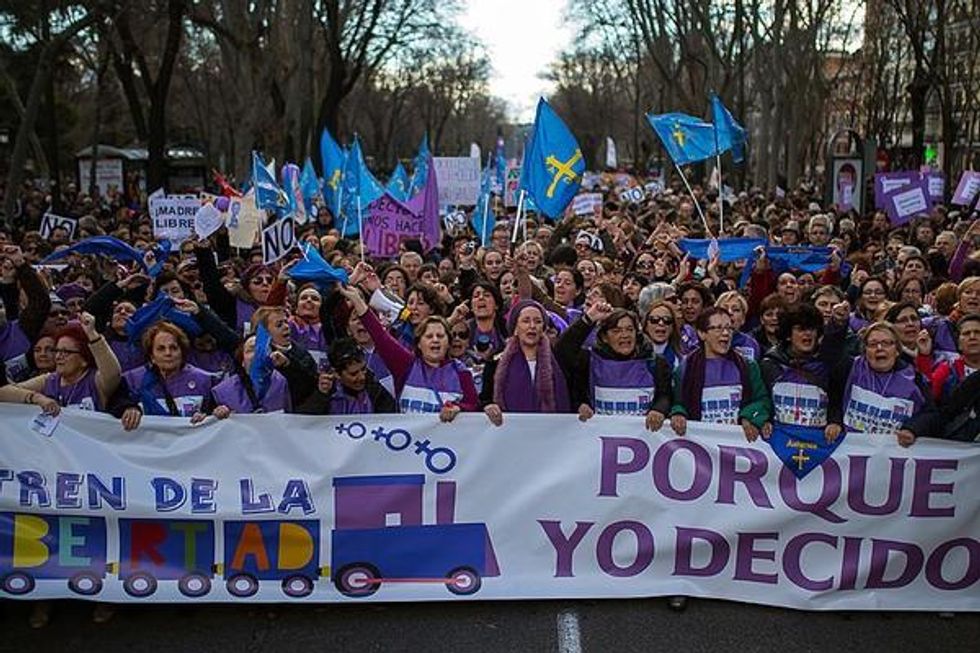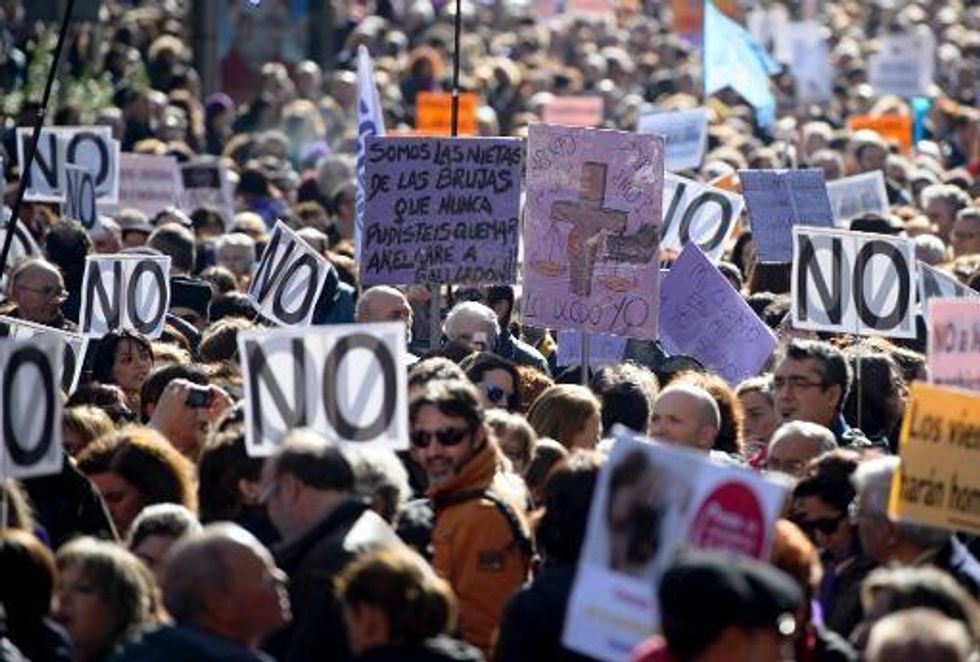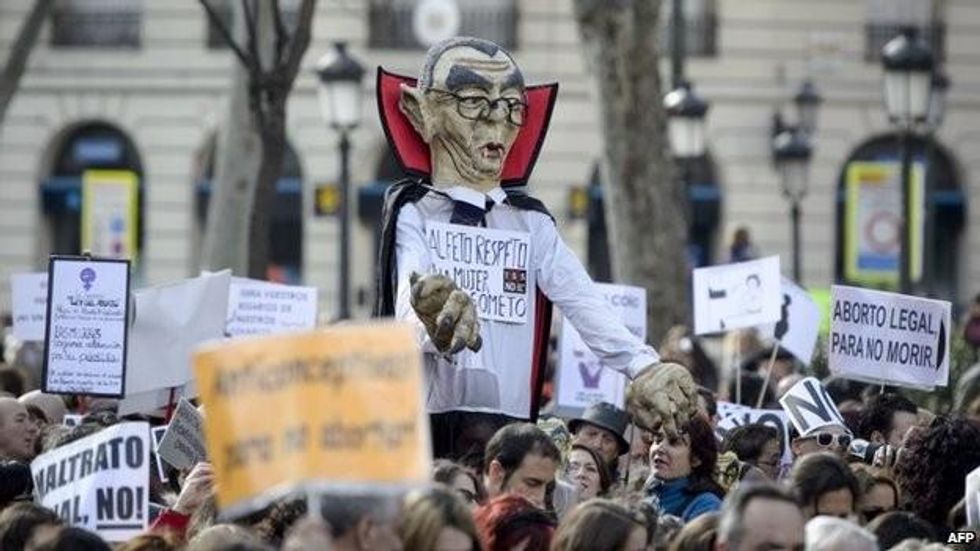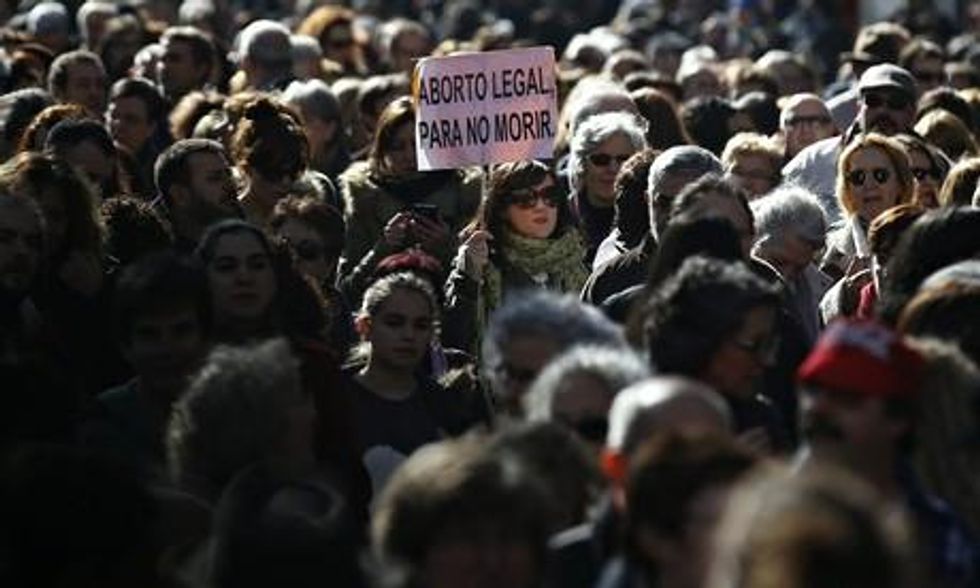

SUBSCRIBE TO OUR FREE NEWSLETTER
Daily news & progressive opinion—funded by the people, not the corporations—delivered straight to your inbox.
5
#000000
#FFFFFF
To donate by check, phone, or other method, see our More Ways to Give page.


Daily news & progressive opinion—funded by the people, not the corporations—delivered straight to your inbox.

Banners declared "Because I decide" and "It's my right, it's my life" as the massive crowd marched to Parliament in the largest protest since Spain's ruling conservative government backed the anti-choice legislation in December.
People from across Spain joined in the demonstration, which was organized by dozens of women's rights, feminist, and reproductive justice groups. Numbered among the protesters was a "freedom train" of at least 100 people who had traveled from Gijon in the north.
Many of the bill's opponents warn it threatens to set back the clock on women's rights to the era of fascist rule under dictator Francisco Franco.
"I came because I think this takes our country back many years regarding women's rights, criminalizing something that shouldn't be a crime," said Ana Alonso, who was demonstrating in Madrid, according to the BBC.
"We overcame this a long time ago and we have a right to have abortion performed under proper conditions without risking women's lives and their health."
Meanwhile, thousands rallied at the Spanish Embassy in Paris -- wielding knitting needles to illustrate the dangerous, clandestine abortions they say many in Spain will be driven to if the anti-choice legislation passes. At least 100 people marched in London to show solidarity, many of them waving coat-hangers.
The draft legislation would, if passed, limit abortion rights to incidents of rape or serious health risk to the pregnant person, force those under age 18 to get their parents' consent, and impose more stringent conditions for aborting a fetus due to malformation.
Approved by Prime Minister Mariano Rajoy's cabinet in December, the bill is believed to be an attempt to mollify the right-wing of the ruling conservative People's Party. The attempt to curb abortin rights comes just four years after the country legalized abortion on demand within the first 14 weeks of pregnancy.
The draft legislation comes despite polling that shows 80 percent of people in Spain, including practicing Catholics, support access to abortion on demand.
Begona Pinero, who is involved in a feminist group that organized the "freedom trains," told AFP that she journeyed to Madrid "to tell conservative (Justice) Minister Alberto Ruiz-Gallardon that we don't want him to change the law."
She added, "We the women are free and we are capable of deciding when we want to become a mother."



Dear Common Dreams reader, The U.S. is on a fast track to authoritarianism like nothing I've ever seen. Meanwhile, corporate news outlets are utterly capitulating to Trump, twisting their coverage to avoid drawing his ire while lining up to stuff cash in his pockets. That's why I believe that Common Dreams is doing the best and most consequential reporting that we've ever done. Our small but mighty team is a progressive reporting powerhouse, covering the news every day that the corporate media never will. Our mission has always been simple: To inform. To inspire. And to ignite change for the common good. Now here's the key piece that I want all our readers to understand: None of this would be possible without your financial support. That's not just some fundraising cliche. It's the absolute and literal truth. We don't accept corporate advertising and never will. We don't have a paywall because we don't think people should be blocked from critical news based on their ability to pay. Everything we do is funded by the donations of readers like you. Will you donate now to help power the nonprofit, independent reporting of Common Dreams? Thank you for being a vital member of our community. Together, we can keep independent journalism alive when it’s needed most. - Craig Brown, Co-founder |

Banners declared "Because I decide" and "It's my right, it's my life" as the massive crowd marched to Parliament in the largest protest since Spain's ruling conservative government backed the anti-choice legislation in December.
People from across Spain joined in the demonstration, which was organized by dozens of women's rights, feminist, and reproductive justice groups. Numbered among the protesters was a "freedom train" of at least 100 people who had traveled from Gijon in the north.
Many of the bill's opponents warn it threatens to set back the clock on women's rights to the era of fascist rule under dictator Francisco Franco.
"I came because I think this takes our country back many years regarding women's rights, criminalizing something that shouldn't be a crime," said Ana Alonso, who was demonstrating in Madrid, according to the BBC.
"We overcame this a long time ago and we have a right to have abortion performed under proper conditions without risking women's lives and their health."
Meanwhile, thousands rallied at the Spanish Embassy in Paris -- wielding knitting needles to illustrate the dangerous, clandestine abortions they say many in Spain will be driven to if the anti-choice legislation passes. At least 100 people marched in London to show solidarity, many of them waving coat-hangers.
The draft legislation would, if passed, limit abortion rights to incidents of rape or serious health risk to the pregnant person, force those under age 18 to get their parents' consent, and impose more stringent conditions for aborting a fetus due to malformation.
Approved by Prime Minister Mariano Rajoy's cabinet in December, the bill is believed to be an attempt to mollify the right-wing of the ruling conservative People's Party. The attempt to curb abortin rights comes just four years after the country legalized abortion on demand within the first 14 weeks of pregnancy.
The draft legislation comes despite polling that shows 80 percent of people in Spain, including practicing Catholics, support access to abortion on demand.
Begona Pinero, who is involved in a feminist group that organized the "freedom trains," told AFP that she journeyed to Madrid "to tell conservative (Justice) Minister Alberto Ruiz-Gallardon that we don't want him to change the law."
She added, "We the women are free and we are capable of deciding when we want to become a mother."




Banners declared "Because I decide" and "It's my right, it's my life" as the massive crowd marched to Parliament in the largest protest since Spain's ruling conservative government backed the anti-choice legislation in December.
People from across Spain joined in the demonstration, which was organized by dozens of women's rights, feminist, and reproductive justice groups. Numbered among the protesters was a "freedom train" of at least 100 people who had traveled from Gijon in the north.
Many of the bill's opponents warn it threatens to set back the clock on women's rights to the era of fascist rule under dictator Francisco Franco.
"I came because I think this takes our country back many years regarding women's rights, criminalizing something that shouldn't be a crime," said Ana Alonso, who was demonstrating in Madrid, according to the BBC.
"We overcame this a long time ago and we have a right to have abortion performed under proper conditions without risking women's lives and their health."
Meanwhile, thousands rallied at the Spanish Embassy in Paris -- wielding knitting needles to illustrate the dangerous, clandestine abortions they say many in Spain will be driven to if the anti-choice legislation passes. At least 100 people marched in London to show solidarity, many of them waving coat-hangers.
The draft legislation would, if passed, limit abortion rights to incidents of rape or serious health risk to the pregnant person, force those under age 18 to get their parents' consent, and impose more stringent conditions for aborting a fetus due to malformation.
Approved by Prime Minister Mariano Rajoy's cabinet in December, the bill is believed to be an attempt to mollify the right-wing of the ruling conservative People's Party. The attempt to curb abortin rights comes just four years after the country legalized abortion on demand within the first 14 weeks of pregnancy.
The draft legislation comes despite polling that shows 80 percent of people in Spain, including practicing Catholics, support access to abortion on demand.
Begona Pinero, who is involved in a feminist group that organized the "freedom trains," told AFP that she journeyed to Madrid "to tell conservative (Justice) Minister Alberto Ruiz-Gallardon that we don't want him to change the law."
She added, "We the women are free and we are capable of deciding when we want to become a mother."


